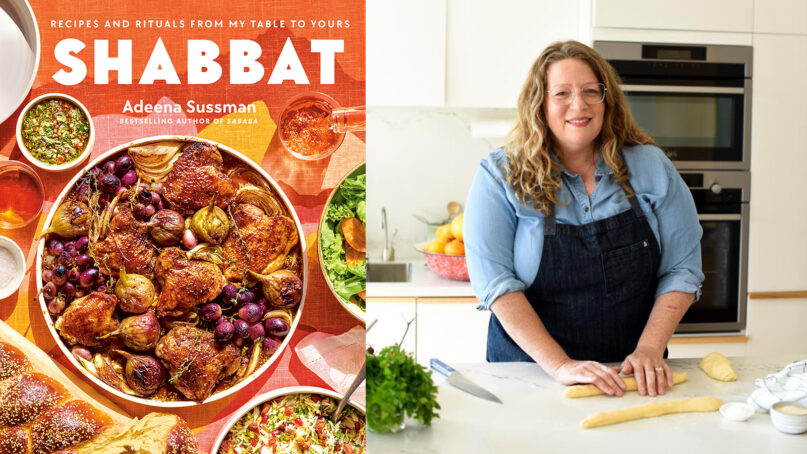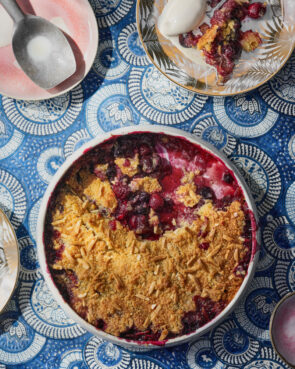(RNS) — Ashkenazi food, the kind prepared by Jews descended from Central and Eastern Europe, has gotten a bad rap.
Dishes such as gefilte fish, kugel (a baked potato or noodle casserole), matzo ball soup or cholent (a meat and potato stew) are often viewed as bland, dull, outdated, Old World.
Yet it’s precisely these foods that the U.S.-Israeli cookbook author Adeena Sussman is now attempting to revive with her newest recipe collection, “Shabbat: Recipes and Rituals from My Table to Yours.”
The author of 15 cookbooks, Sussman until recently served as recipe developer and writer for celebrities such as Candace Nelson, founder of Sprinkles cupcake bakery, and Chrissy Teigen, the model turned cookbook author and social media influencer. But over the past few years, Sussman has emerged as a celebrity in her own right. Her previous book, “Sababa,” a deep dive into foods inspired by Israelis of Middle Eastern descent, was named one of the best cookbooks of 2019 by The New York Times.
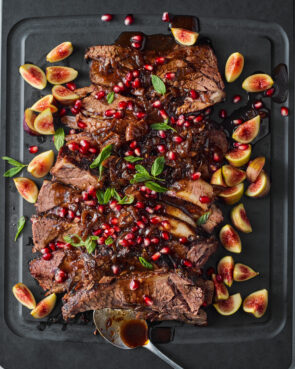
Fig and Pomegranate Brisket in “Shabbat.” (Courtesy photo)
With her latest book, she turns back to her roots. Sussman grew up in Palo Alto, California, in a Modern Orthodox home. Her mother cooked dishes typical of the Ashkenazi tradition, especially on Shabbat — the Friday night meal Jews enjoy after the obligatory rituals of lighting the candles and blessing the wine and the challah.
Sussman, who has lived in Tel Aviv for the past decade, is no longer an Orthodox Jew. But she and her husband still gather around the table for a home-cooked Shabbat meal. And on these occasions she will often cook the foods her mother made — updated and reimagined with classic Israeli staples, like tahini, harissa or amba, a tangy mango pickle condiment.
For Sussman, Shabbat is a time to relax, unwind and feast. It is a time, she writes, of “spiritual tranquility.”
Religion News Service spoke to Sussman while she was on a nine-week book tour that took her to Jewish community centers, synagogues and restaurants in Atlanta, Boston, Chicago, Los Angeles, New York, Toronto and Washington. The interview was edited for length and clarity.
What led you to write “Shabbat”?
When I was looking for a subject that would help me expand my own education and also continue to shine a light on the diversity of Israel, Shabbat just kept coming up because it’s a national holiday that 80% of Israelis celebrate weekly. And the focal point is food. From a personal perspective, it was gonna help me continue to explore that Venn diagram of my Jewish identity, my Israeli identity and my culinary identity. Shabbat was the perfect vehicle for that personal journey as well.
What was it like growing up Orthodox in Palo Alto?
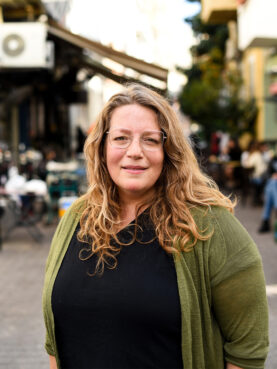
Adeena Sussman. (Photo by Lisa Rich)
We were in some ways a very average middle-class American Ashkenazi Jewish family.
My parents moved to the Bay Area in 1966 so my father could pursue his graduate studies at Stanford. They arrived at a place where there weren’t a lot of Orthodox Jewish institutions, so they were very involved in helping establish a school and a shul (synagogue) and all those sort of institutions of Orthodox Jewish life. My parents even sold kosher cheese from our garage for nine years because you couldn’t get kosher cheese in Northern California. We had four refrigerators in our garage, in addition to another fridge we used to store our kosher meat, shipped monthly from Chicago.
Shabbat was really the center of our week. We always stopped everything when Shabbat started. There was lots of together time, obviously, candle lighting, and we sang songs at the table. It was a very beautiful time in my life that I only have super positive memories of, even though I’m no longer Orthodox. It really set me up for understanding the value of a spiritual aspect to life and infusing cooking and eating with Jewish values, including hospitality and welcoming strangers into your home.
What kinds of foods did your mother put on the table for Shabbat?
I would say 90% of the time it was chicken. Oftentimes there was also chicken soup. My mom made what I call overnight chicken soup. It was cooked for 12 hours at a very low temperature.
And then a simple roast chicken, some kind of a kugel and a vegetable side dish and a salad. She made potato kugel, but more often she made sort of a, like a melange of zucchini, carrots, onions and potatoes. It was a little bit lighter and a little bit more Californian in style. And also, nice kosher California wines. My father would drive to Napa or Sonoma and buy wines by the case that we would drink at the table. We would make kiddush with Manischewitz (a sweet concord grape wine) like everybody else. But then we would drink nice wine. It was very simple. My mother was a delicious homestyle cook.
Ashkenazi food has been so pilloried. Do you like it?
It’s starting to reclaim some of its dignity now. But yes, I enjoyed it and honestly, I didn’t really know anything different. We were very Ashkenormative, as people say these days. I liked the food and I still like the food, not only because it’s my family’s food, but because it’s the food of my people and the heritage food of many, many Jews.
- Cardamom and Berry Crisp in “Shabbat.” (Courtesy photo)
- Pomegranate Sumac Margaritas in “Shabbat.” (Courtesy photo)
As it relates to Israel, you know, the founders of the state of Israel were Ashkenazi and I think that those foods took center stage in the early days of the state. Since the late 1970s or early ’80s, Mizrahi and Sephardic food and culture are the ascendant cultures in Israel and Ashkenazi food kind of took a back seat in many ways. I would say schnitzel is one of the few Ashkenazi dishes that continues to be a staple in modern Israel cooking.
The Israeli food scene has become super popular around the world. Are American Jews still interested in Ashkenazi food?
Israelis are really great ambassadors of their culture and food has been a very positive and impactful way to share Israel with the world. It has to do with people’s interest in a plant-based Mediterranean style diet. And also in the fact that Israelis are very entrepreneurial in nature.
What’s interesting now is that there are people like Jeffrey Yoskowitz and Liz Alpern, who wrote “The Gefilte Manifesto.” They went back to their family roots in Eastern Europe to tell a richer story about the origins of the food. And also to show people that those foods also had seasonal, artisan and plant-based elements to them, like pickling and foraging and seasonal fruits and berries. And so I think they were instrumental in helping to retell a story that had gotten lost or sidelined.
In Israel, I’m waiting for the next generation of Ashkenazi food revival at the hands of some young chefs. Maybe, maybe it’ll come from a Russian Israeli cook, or maybe from someone else. Every cuisine goes through its update.
Tell me what your Shabbat is like now.
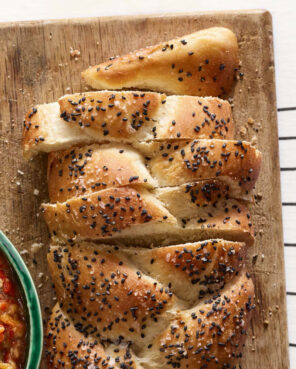
Water Challah in “Shabbat.” (Courtesy photo)
For me, a lot of it is about preparing for Shabbat. I find Fridays to be incredibly nourishing because Friday is a day off in Israel. I have the opportunity to prepare for the weekend as the day progresses. That involves going to the shuk (the Carmel Market) every Friday, having my morning coffee at my coffee shop, which is really like my second home. Usually we invite a few people over for dinner, family or close friends. We don’t go out to eat on Friday nights. We light candles; we’ll make the (blessing) over the challah, but we might not necessarily sing all of the songs I grew up singing.
Food-wise, there’s always homemade challah. I’m a huge lover of soup. So there’s often soup. And then usually some kind of a large format protein, like roast chicken or a big whole fish or some kind of meat dish or a vegetarian dish, depending on who we’re having over.
But if I’m alone with my husband, I’ll probably make a roast chicken or Chraime, a Moroccan fish, and some kind of potatoes and a big salad and challah and that’ll be our Shabbat meal, which I am super happy about.
My whole premise for the Shabbat book is that Shabbat meets you where you’re at and you meet Shabbat where it’s at. I think having rituals is important, especially right now. And I love doing certain things weekly, but I don’t want people to feel that if they don’t do it a certain way they shouldn’t do it at all. To me, Shabbat is so much a spiritual pursuit and a very personal thing. It’s as much a cultural construct as a religious one. And there are just a lot of different ways to express it and observe it.
